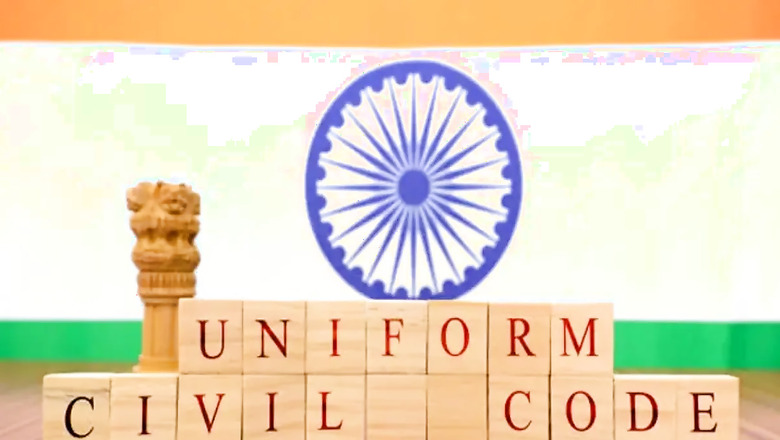
views
India’s pluralistic legal system, which grants different religious communities their own personal laws governing areas such as marriage, divorce, inheritance, and adoption, has long been the subject of debate. The issue of a Uniform Civil Code (UCC) has occupied the discourse of legal and social reform in India for decades, drawing attention to the potential for a standardised set of laws to promote gender equality.
The Directive Principles of State Policy under Article 44 of the Indian Constitution call upon the state to enact a UCC, yet nearly 75 years since India’s independence, this principle remains unimplemented.
In a country as diverse as India, with a multiplicity of religious traditions and personal laws, a UCC offers a significant step toward ensuring equality before the law, particularly in the context of gender justice. As India undergoes significant domestic and global transformations — from becoming a telecommunications powerhouse to the recent replacement of the iconic blindfolded Lady Justice statue at the Supreme Court with a new image representing fairness — implementing the UCC is increasingly seen as an essential reform to align the country with its vision of Viksit Bharat 2047 (Developed India 2047).
The Status Quo: Personal Laws and Gender Inequality
India’s personal law regime, which varies according to religious affiliation, has long perpetuated gender disparities. This system allows distinct personal laws for Hindus, Muslims, Christians, Parsis, and others, creating a fragmented legal framework that reinforces patriarchal structures. Initially seen as a way to preserve the cultural autonomy of various communities, this arrangement has resulted in legal inequalities that disproportionately affect women, particularly in matters of marriage, divorce, inheritance, and guardianship.
- Hindu Personal Law: The reformation of Hindu laws post-Independence, through the Hindu Marriage Act (1955) and the Hindu Succession Act (1956), introduced significant changes. The 2005 amendment to the Hindu Succession Act granted daughters equal rights to ancestral property. However, patriarchal practices such as dowry and the preferential treatment of male heirs in inheritance remain persistent challenges.
- Muslim Personal Law: Under the Muslim Personal Law (Shariat) Application Act of 1937, Muslim women face significant legal disadvantages. Despite the 2019 Supreme Court ruling banning triple talaq, discriminatory practices related to inheritance and unilateral divorce rights persist under traditional interpretations of Sharia law.
- Christian and Parsi Personal Laws: Under the Christian Marriage Act of 1872 and the Indian Divorce Act of 1869, Christian women historically faced difficulties securing divorce. While reforms have improved some provisions, Parsi women continue to experience discrimination in property inheritance, particularly if they marry outside the community.
The disparate and gender-biased nature of these personal laws underscores the need for a unified legal framework that promotes equality across religious boundaries, fostering gender justice in a pluralistic society like India.
Uniform Civil Code: A Legal Instrument for Gender Justice
The implementation of a Uniform Civil Code has the potential to address deeply entrenched gender biases across religious personal laws by creating a common legal framework applicable to all citizens. A well-designed UCC would prioritise constitutional values of equality, non-discrimination, and justice while ensuring that individual rights, particularly women’s rights, are not subordinated to religious customs.
- Equal Rights in Marriage and Divorce: A UCC could eliminate discriminatory practices such as child marriage, polygamy, and unilateral divorce rights by establishing uniform standards that uphold gender parity. All citizens, irrespective of religion, would be governed by the same legal provisions for marriage and divorce, thus ensuring equal protections for women.
- Inheritance and Property Rights: A UCC would provide equal inheritance rights to women across all communities, ending discriminatory practices in Muslim and Parsi personal laws. This would significantly enhance women’s financial independence and security, enabling them to claim equal shares of ancestral property.
- Guardianship and Custody: The current personal law framework often relegates women to secondary status in matters of guardianship and custody. A UCC could ensure equal parental rights for men and women, particularly in cases of child custody, adoption, and guardianship, thereby supporting gender equity.
The UCC is not merely a legal reform but also a symbol of India’s commitment to modernising its legal system in line with constitutional principles of justice, equality, and non-discrimination. By drawing from the best practices of various religious traditions while prioritizing universal human rights, a UCC would create a legal landscape that reflects contemporary values.
India’s Ongoing Transformations: UCC as Part of Viksit Bharat 2047
India, as a nation, is undergoing profound transformations, both domestically and globally. As it ascends to leadership positions in sectors like telecommunications, digital technology, and space exploration, these advancements are paralleled by significant changes in the country’s legal and cultural landscape. The recent decision to replace the blindfolded Lady Justice statue at the Supreme Court with a new figure that symbolises balance, fairness, and the inherent diversity of India’s legal traditions is emblematic of these shifts.
India’s ambitious Viksit Bharat 2047 initiative, which envisions the country as a developed nation by 2047, emphasises a range of reforms aimed at boosting economic growth, infrastructure development, social welfare, and legal modernization. The UCC, if implemented, would align with this vision by addressing gender inequalities within India’s legal framework. Such a reform would not only promote gender justice but also reflect India’s aspirations to modernize its domestic institutions in line with global standards of human rights and legal equity.
As India transitions into a telecommunications powerhouse and assumes greater global responsibilities in multilateral forums, its domestic legal framework must similarly evolve to reflect the principles of justice and equality enshrined in the Constitution. The UCC, by harmonising personal laws, would serve as a vital reform in realizing the goals of Viksit Bharat, ensuring that India’s march toward development is inclusive, equitable, and just.
Legal, Political, and Social Challenges
Despite the UCC’s potential for promoting gender equality, its implementation faces significant legal, political, and social challenges. Many religious communities view personal laws as intrinsic to their cultural and religious identity. Consequently, the UCC is often perceived as an attempt to impose a homogenized legal framework that could infringe upon Article 25, which guarantees the right to freely practice and propagate religion.
The political landscape surrounding the UCC is similarly complex. Successive governments have grappled with the question of whether implementing a UCC would alienate religious minorities, particularly the Muslim community, which views the code as a threat to their religious autonomy. While the ruling BJP has consistently advocated for the UCC, the issue remains deeply polarizing across the political spectrum.
The successful implementation of a UCC would signal India’s commitment to gender justice and its ambition to become a global leader in both economic development and human rights advocacy. It could also serve as a catalyst for broader social reform, encouraging communities to rethink patriarchal norms that have long been accepted as part of religious tradition.
The Uniform Civil Code has the potential to address some of the most pressing issues surrounding gender inequality in India’s legal system. By offering a unified legal framework that guarantees equal rights for all citizens, irrespective of religion, the UCC aligns with India’s constitutional vision of equality, justice, and non-discrimination.
As India continues to undergo profound transformations under its Viksit Bharat 2047 agenda, the implementation of the UCC would represent a necessary domestic reform to ensure that the country’s legal system is modern, inclusive, and gender-just.
The road to a UCC, however, is fraught with challenges. Success will depend on a careful and inclusive approach that respects India’s cultural and religious diversity while advancing the universal principles of human rights and gender equality. By fostering dialogue, building consensus, and ensuring that reforms are inclusive, the UCC could become a cornerstone of legal modernization and a transformative tool for creating a more just and equitable society.
The author is a Junior Research Consultant at Indian Council of Social Science research. Her areas of work include gender intersectionality, conflict and development. Views expressed in the above piece are personal and solely those of the author. They do not necessarily reflect News18’s views.




















Comments
0 comment